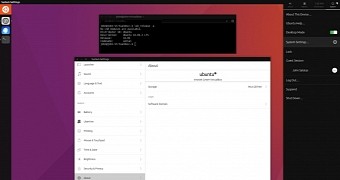Yunit, the community-driven Unity 8 fork created soon after Canonical and Ubuntu founder Mark Shuttleworth announced that his company would no longer be involved in the development of the Unity 8 user interface for phones or desktops, now has a repository for Ubuntu 16.04 LTS (Xenial Xerus) systems.
The team behind Yunit has been hard at work on this new overlay repository over the past month, allowing users to install it on their Ubuntu 16.04 LTS installations, no matter if they're using Ubuntu 16.04.1 or Ubuntu 16.04.2, and it even works on top of your Ubuntu GNOME 16.04 LTS, Xubuntu 16.04 LTS or Lubuntu 16.04 LTS installations if you want an alternative desktop environment based on Unity 8.
"We are pleased to announce that Yunit is now available as an overlay repository for Ubuntu 16.04 LTS xenial (64bit)," says Yunit developer John Salatas in today's announcement. "The following have been tested and should work with an existing Ubuntu 16.04, Ubuntu GNOME 16.04, Lubuntu 16.04, and Xubuntu 16.04 installation."
Here's how to install Yunit on Ubuntu 16.04 LTS
First off, please note that it's not possible to install Yunit neither Kubuntu 16.04 LTS or Ubuntu MATE 16.04 LTS because they run outdated Qt libraries, and Yunit needs Qt 5.9 LTS or later to work correctly. Now, installing it is as easy as opening a terminal emulator and running the commands listed below. When asked, during the installation, choose LightDM as default login manager.
wget -qO - https://archive.yunit.io/yunit.gpg.key | sudo apt-key add
echo 'deb [arch=amd64] http://archive.yunit.io/ubuntu/ xenial main' | sudo tee /etc/apt/sources.list.d/yunit.list
echo 'deb-src http://archive.yunit.io/ubuntu/ xenial main' | sudo tee --append /etc/apt/sources.list.d/yunit.list
sudo apt update
sudo apt upgrade
sudo apt install yunit-desktop
After installation, you can choose the Yunit session from the login screen. Please note that Yunit is still in development, and it's considered alpha quality software at the moment, so chances are you might encounter some crashes or other issues on a daily base use. As for the future, Yunit devs plan to add support for more recent Ubuntu Linux releases, and, why not, even support for 32-bit installations.

 14 DAY TRIAL //
14 DAY TRIAL //